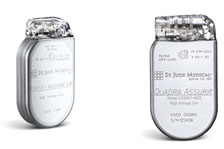A NUMBER of south Warwickshire patients had to have pacemaker-style devices replaced after the product was linked to risk of death.
Nearly 40 patients in the area had a St Jude Medical Implantable Cardioverter Defibrillator fitted – which sends out electric pulses to shock the heart back into rhythm.
The devices – which are around the same size as a matchbox and are fitted under the collar bone – are often used by people with potentially life-threatening irregular heartbeat or heart failure.
But a warning was issued to doctors after two people in Europe died due to the batteries failing suddenly.
In Canada many people reported losing consciousness due to lack of blood to the brain when the equipment faltered.
It was only devices made between 2010 and 2015 which were affected.
South Warwickshire Foundation Trust – which runs Warwick, Leamington, Stratford and Shipston hospitals – say they have 36 patients fitted with the defibrillator.
Eight were deemed to be at risk and had the device replaced.
A spokeswoman told the Observer: “Following the national recall of St Jude Medical Implantable Cardioverter Defibrillators, the trust acted immediately and took the necessary steps to ensure no patients were harmed.
“The trust had 36 patients using the equipment and none have been affected by the manufacturing fault.
“There were eight patients who could have been at risk due to the manufacturing fault and all of these patients have had the equipment replaced. The other patients will be monitored, as should the equipment develop the fault they will not be at any immediate risk and the defibrillators can be replaced in a timely fashion.”
The defibrillators are meant to last for at least seven years before their batteries deplete and need replacing.
They are designed to vibrate at regular intervals once power begins to decline – which signals to patients that they must see their doctors for a replacement within 90 days.
But some of the devices – which had been implanted in 400,000 patients worldwide – stopped working just 24 hours after patients received the telltale vibratory alert.











